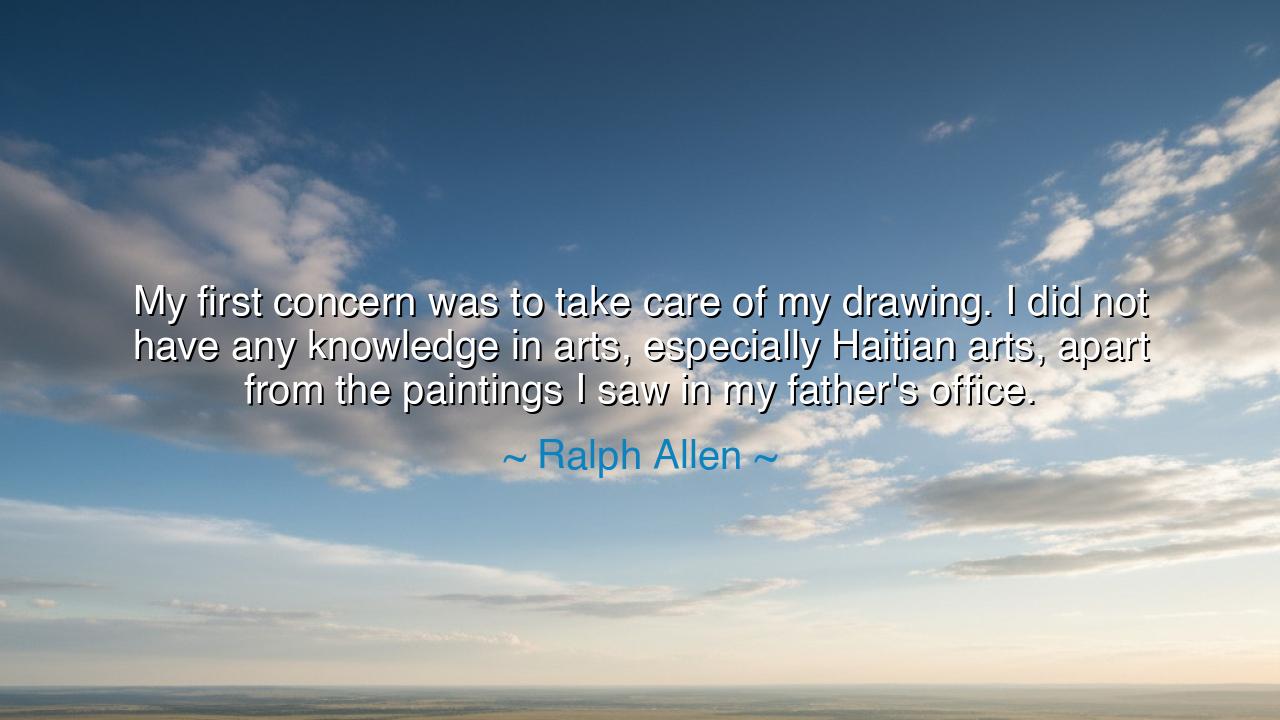
My first concern was to take care of my drawing. I did not have
My first concern was to take care of my drawing. I did not have any knowledge in arts, especially Haitian arts, apart from the paintings I saw in my father's office.






“My first concern was to take care of my drawing. I did not have any knowledge in arts, especially Haitian arts, apart from the paintings I saw in my father’s office.”
Thus spoke Ralph Allen, one of the great voices of Haitian art — a painter who, though born in simplicity, rose to shape a nation’s vision of itself. His words, gentle in tone yet deep in meaning, reveal the humility and devotion of an artist at the dawn of his calling. In them lives a timeless truth: that the seed of genius is not knowledge, but care; that before mastery comes reverence — the reverence for the work, the line, the craft, and the soul that moves within it. For Allen’s concern was not fame, nor theory, nor influence, but simply to take care — to nurture his art as one tends a flame in the wind.
When he says, “I did not have any knowledge in arts, especially Haitian arts,” he confesses not weakness, but purity. For true creation begins not in certainty, but in wonder. The mind that is too full of rules cannot dream freely; the hand too burdened with technique forgets the joy of discovery. Allen began as many masters do — in ignorance that was sacred, for it left him open to the language of his heart. His education was the eye, his teacher was observation, and his first gallery was the paintings in his father’s office — simple relics that whispered to him of beauty, of identity, of possibility. From these fragments, he wove his vision, not imitating what he saw, but awakening what already lived within him.
The origin of this quote lies in Allen’s early reflections on his artistic journey in Haiti, a land of radiant color and fierce spirit. He came of age in a world where art was not merely decoration, but testimony — a mirror of history, a weapon of dignity, a vessel for hope. Yet he began not with great teachers or formal training, but with devotion. In a nation marked by struggle and rebirth, he taught himself to see — to see not only the shape of things, but the soul behind them. His “concern for his drawing” was, in truth, a concern for truth itself — the discipline of giving form to what the heart feels but cannot say.
There is a profound humility in his words, and from that humility springs strength. Many seek knowledge before they begin, waiting to be certain before daring to act. But Ralph Allen reminds us that knowledge grows through creation, not before it. The potter learns by shaping clay; the poet learns by writing words that falter; the painter learns by tracing lines that tremble. The ancients knew this well — that art, like life, begins in imperfection. It is through care and persistence, not instant mastery, that beauty emerges. To “take care of one’s drawing” is to show respect for the divine spark within, trusting that diligence and love will give birth to understanding.
Consider the story of Vincent van Gogh, who, like Allen, began his journey without formal mastery. He struggled, he failed, he wandered — yet he drew with care, every stroke a prayer, every canvas a confession. Though rejected in his time, he painted as one who tended something sacred within himself. From his solitude blossomed works that now speak to the world in colors of eternity. Like Allen, he understood that the soul of art is not in the accumulation of knowledge, but in the purity of devotion. Knowledge refines, but care creates.
Ralph Allen’s words also speak to something deeply Haitian — the spirit of creation born not from abundance, but from resilience. Haiti’s artists, poets, and musicians have long drawn inspiration from struggle, transforming hardship into harmony. For Allen to begin with “no knowledge of Haitian arts” is to begin as a child of the soil itself, untrained yet innately connected to the rhythms, textures, and colors of his homeland. His art would later embody this union — the meeting of instinct and intellect, of self-taught vision and national soul. In him, as in all true artists, ignorance was not a void, but a fertile silence waiting to be filled with truth.
Thus, the lesson of Ralph Allen’s words is clear: begin with care. Do not wait for perfect knowledge before creating; do not fear your lack of schooling or experience. For knowledge without love is hollow, but love without knowledge can still become wisdom. Care for your craft as a gardener tends a seed — with patience, discipline, and tenderness. Whatever your art may be — painting, writing, teaching, or living — begin where you are, and let devotion be your first teacher.
So, O seeker of creation, take this counsel to heart: when you begin your work, take care of your drawing — whatever form your drawing takes. Let your hands move, even if uncertain; let your heart lead, even if you do not yet understand. For in that act of care, knowledge will come — not from books or lectures, but from the quiet revelation of doing. Ralph Allen began with only the memory of a few paintings, yet through care he became a master. So too may you, if you treat your work not as a burden, but as a living thing — something to be nourished, protected, and loved until it reveals its soul.






AAdministratorAdministrator
Welcome, honored guests. Please leave a comment, we will respond soon